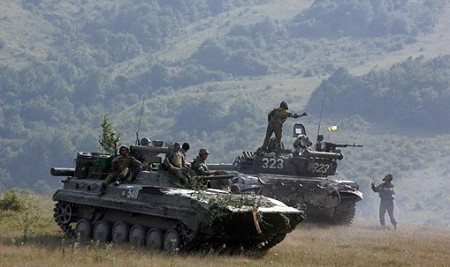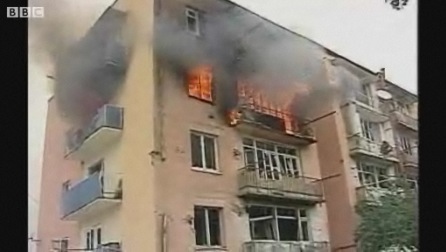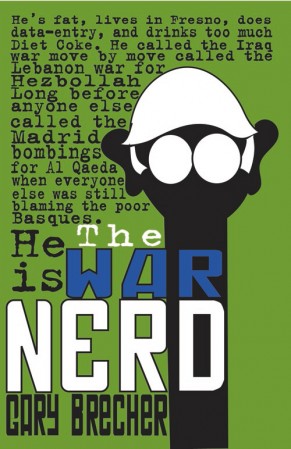There are three basic facts to keep in mind about the smokin’ little war in Ossetia:
1. The Georgians started it.
2. They lost.
3. What a beautiful little war!
For me, the most important is #3, the sheer beauty of the video clips that have already come out of this war. I’m in heaven right now.
Of course, if you want to get all serious and actually study up on Ossetia, North and South, and Georgia and the whole eternal gang war that they call the Caucasus, you can check out a column I did on that school-hostage splatter in Beslan, North Ossetia, a few years back.
But for me, right now, I say let’s stick to the action. This is the war of my dreams—both sides using air forces! How often do you see that these days?—so I’ll skip the history. Just remember that South Ossetia is a little apple-shaped blob dangling from Russian territory down into Georgia, and most of it has been under control of South Ossetian irregulars backed by Russian “peacekeepers” for the last few years.
The Georgians didn’t like that. You don’t give up territory in that part of the world, ever. The Georgians have always been fierce people, good fighters, not the forgiving type. In fact, I can’t resist a little bit of history here: remember when the Mongols wiped out Baghdad in 1258, the biggest slaughter in any of their conquests? Nobody knows how many people were killed, but it was at least 200,000—a pretty big number in the days before antibiotics made life cheap. The smell was so bad the Mongols had to move their camp upwind. Well, the most enthusiastic choppers and burners in the whole massacre were the Georgian Christian troops in Hulagu Khan’s army. Wore out their hacking arms on those Baghdadi civilians.
So: hard people on every side in that part of the world. No quarter asked or given. No good guys. Especially not the Georgians. They have a rep as good people, one-on-one, but you don’t want to mess with them and you especially don’t want to try to take land from them.
The Georgians bided their time, then went on the offensive, Caucasian style, by pretending to make peace and all the time planning a sneak attack on South Ossetia. They just signed a treaty granting autonomy to South Ossetia this week, and then they attacked, Corleone style. Georgian MLRS units barraged Tskhinvali, the capital city of South Ossetia; Georgian troops swarmed over Ossetian roadblocks; and all in all, it was a great, whiz-bang start, but like Petraeus asked about Iraq way back in 2003, what’s the ending to this story? As in: how do you invade territory that the Russians have staked out for protection without thinking about how they’ll react?
Saakashvili just didn’t think it through. One reason he overplayed his hand is that he got lucky the last time he had to deal with a breakaway region: Ajara, a tiny little strip of Black Sea coast in southern Georgia. This is a place smaller than some incorporated Central Valley towns, but it declared itself an “autonomous” republic, preserving its sacred basket-weaving traditions or whatever. You just have to accept that people in the Caucasus are insane that way; they’d die to keep from saying hello to the people over the next hill, and they’re never going to change. The Ajarans aren’t even ethnically different from Georgians; they’re Georgian too. But they’re Muslims, which means they have to have their own Lego parliament and Tonka-Toy army and all the rest of that Victorian crap, and their leader, a wack job named Abashidze (Goddamn Georgian names!) volunteered them to fight to the death for their worthless independence. Except he was such a nut, and so corrupt, and the Ajarans were so similar to the Georgians, and their little “country” was so tiny and ridiculous, that for once sanity prevailed and the Ajarans refused to fight, let themselves get reabsorbed by that Colussus to the North, mighty Georgia.
Well, like I’ve said before, there’s nothing as dangerous as victory. Makes people crazy. Saakashvili started thinking he could gobble up any secessionist region—like, say, South Ossetia. But there are big differences he was forgetting—like the fact that South Ossetia isn’t Georgian, has a border with Russia, and is linked up with North Ossetia just across that border. The road from Russia to South Ossetia is pretty fragile as a line of supply; it goes through the Roki Tunnel, a mountain tunnel at an altitude of 10,000 feet. I have to wonder why the Georgian air force—and it’s a good one by all accounts—didn’t have as its first mission in the war the total zapping of the South Ossetian exit of that tunnel. Or if you don’t trust the flyboys, send in your special forces with a few backpacks full of HE. There are a lot of ways to cripple a tunnel. Hell, do it low-tech: drive a fuel truck in there, with a car following, jackknife the truck halfway through with a remote control or timing fuse—truck driver gets out and strolls to the car, one fast U-turn and you’re out and back in Georgia, just in time to see a ball of flame erupt from the tunnel exit. And rebuilding a tunnel way up in the mountains is not an easy or a fast job. Sure, the Russians could resupply by air, but that’s a much, much tougher job and would at least slow down the inevitable. Weird, then, that as far as I know the Georgians didn’t even try to blast that tunnel. I don’t go in for this kind of long-distance micromanaging of warfare, because there’s usually a good reason on the ground for tactical decisions; it’s the strategic decisions that are really crazy most of the time. But this one I just don’t get.
Most likely the Georgians just thought the Russians wouldn’t react. They were doing something they learned from Bush and Cheney: sticking to best-case scenarios, positive thinking. The Georgian plan was classic shock’n’awe with no hard, grown-up thinking about the long term. Their shiny new army would go in, zap the South Ossetians while they were on a peace hangover (the worst kind), and then…uh, they’d be welcomed as liberators? Sure, just like we were in Iraq. Man, you pay a price for believing in Bush. The Georgians did. They thought he’d help. And I just saw the little creep on TV, sitting in the stands watching the US-China basketball game. (Weird game—the Chinese were taller, muscled the boards inside but couldn’t shoot from outside. Not what you expect from foreign b-ball teams at all.) I didn’t even recognize Bush at first, just wondered why they kept doing close-ups of this guy who looked like Hank Hill’s legless dad up in the stands. Then they said it was the Prez. They talk about people “growing in office”; well, he shrunk.
And the more he shrinks, the more you pay for believing in him. The Georgians were naïve because they were so happy to get out from the Soviets, the Russians’ old enemy, the US, must be paradise. So they did their apple-polishing best to be the perfect obedient little ally. Then we’d let them into NATO and carpet-bomb them with SUVs and ipods.
Their part of the deal was simple: they sent troops to Iraq. First a contingent of 850, then a surprisingly huge 2000 men. When you consider the population of Georgia is less than five million, that’s a lot of troops. In fact, Georgia is the third-biggest contributor to the “Coalition of the Willing,” after the US and Britain.
You might be thinking, Wow, not a good time to have so many of your best troops in Iraq, huh? Well, that’s true and it goes for a lot of countries—like us, for instance—but at least we’re not facing a Russian invasion. The Georgians are so panicked they just announced they’re sending half their Iraqi force home, and could the USAF please give’em a lift?
We’ll probably give them a ride, but that’s about all we can do. We’ve already done plenty, not because we love Georgians but to counterbalance the Russian influence down where the new oil pipeline’s staked out. The biggest American aid project was the GTEP, “Georgia Train and Equip” project ($64 million). It featured 200 Special Forces instructors teaching fine Georgia boys all the lessons the US Army’s learned recently. Now here’s the joke—and military history is just one long series of mean jokes. We were stressing counterinsurgency skills: small-unit cohesion, marksmanship, intelligence. The idea was to keep Georgia safe from Chechens or other Muslim loonies infiltrating through the Pankisi Gorge in NE Georgia. And we did a good job. The Georgian Army pacified the Pankisi in classic Green-Beret style. The punch line is, the Georgians got so cocky from that success, and from their lovefest with the Bushies in DC, that they thought they could take on anybody. What they’re in the process of finding out is that a light-infantry CI force like the one we gave them isn’t much use when a gigantic Russian armored force has just rolled across your border.
The American military’s response so far has been all talk, and pretty damn stupid talk at that. A Pentagon spokes-thingy called Russia’s response “disproportionate.” What the Hell are they talking about? They’ve been watching too many cop shows. Cops have this doctrine of “minimum necessary force,” not that they actually operate that way unless there are video cameras around. Armies never, ever had that policy, because it’s a good way to get your troops killed needlessly. The whole idea in war is to fight as unfairly and disproportionately as possible. If you’ve got it, you use it. Thank God we never fought “proportionately” in Viet Nam. The French tried that, because they never had much of an air force, and got wiped out. By the time the French withdrew from Indochina, their Lefty Prime Minister, Mendes-France, made a big show of promising peace withing 30 days of taking office—and his commanders in Indochina said privately, “I don’t think we can hold out that long.” That’s what fighting “proportionately” gets you: Dien Bien Phu.
If you want a translation, luckily I speak fluent Pentagon. So what “disproportionate” means is—well, imagine that you’re watching some little hanger-on who tags along with you get his ass whipped by a bully, and you say, “That’s inappropriate!” I mean, instead of actually helping him. That’s what “disproportionate” means from the Pentagon: “We’re not going to lift a finger to help you, but hey, we’re with you in spirit, little buddy!”
The quickest way to see who’s winning in any war is to see who asks first for a ceasefire. And this time it was the Georgians. Once it was clear the Russians were going to back the South Ossetians, the war was over. Even Georgians were saying, “To fight Russia by ourselves is insane.” Which means they thought Russia wouldn’t back its allies. Not a bad bet; Russia has a long, unpredictable history of screwing its allies—but not all the time. The Georgians should know better than anybody that once in a while, the Russians actually come through, because it was Russian troops who saved Georgia from a Persian invasion in 1805, at the battle of Zagam. Of course the Russians had let the Persians sack Tbilisi just ten years earlier without helping. That’s the thing: the bastards are unpredictable. You can’t even count on them to betray their friends (though it’s the safer bet, most of the time, sort of like 6:5 odds).
This time, the Russians came through. For lots of reasons, starting with the fact that Bush is weak and they know it; that the US is all tied up in that crap Iraq war and can’t do shit; and most of all, because Kosovo just declared independence from Serbia, an old Russian ally. It’s tit for tat time, with Kosovo as the tit and South Ossetia as the tat. The way Putin sees it, if we can mess with his allies and let little ethnic enclaves like Kosovo declare independence, then the Russians can do the same with our allies, especially naïve idiotic allies like Georgia.
Luckily, South Ossetia doesn’t matter that much. I’m just being honest here. In a year nobody will care much who runs that little glob of territory. What’s more serious is that another, bigger and more strategic chunk of Georgia called Abkhazia, on the Black Sea, is taking the opportunity to boot out the last Georgian troops on its territory. Georgia may lose almost all its coastline, but then the Georgians were always an inland people anyway, living along river valleys, not great sailors.
What’s happening to Georgia here is like the teeny-tiny version of Germany in the twentieth century: overplay your hand and you lose everything. So if you’re a Georgian nationalist, this war is a tragedy; if you’re a Russian or Ossetian nationalist, it’s a triumph, a victory for justice, whatever. To the rest of us, it’s just kind of fun to watch. And damn, this one has been a LOT of fun! The videos that came out of it! You know, DVD is the best thing to happen to war in a long time. All the fun, none of the screaming agony—it’s war as Diet Coke.
See, this is the war that I used to see in the paintings commissioned by Defense contractors in Aviation Week and AFJ: a war between two conventional armies, both using air forces and armored columns, in pine-forested terrain. That was what those pictures showed every time, with a highlighted closeup of the weapon they were selling homing in on a Warsaw Pact convoy coming through a German pine forest. Of course, a real NATO/Warsaw Pact war would never, ever have happened that way. It would have gone nuclear in an hour or less, which both sides knew, which is why it never happened. So all that beautiful weaponry was kind of a farce, if it was only going to be used in the Fulda Gap. But damn, God is good, because here it all is, in the same kind of terrain, all your favorite old images: Russian-made tanks burning, a Soviet-model fighter-bomber falling from the sky in pieces, troops in Russian camo fighting other troops, also in Russian camo, in a skirmish by some dilapidated country shack.
No racial overtones to get bummed out by—everybody on both sides is white! And white from places you don’t know or care about!
The fretting and fussing and sky-is-falling crap about this war is going to die down fast, and the bottom line will be simple: the Georgians overplayed their hand and got slapped, and we caught a little of the follow-through, which is what happens when you waste your best troops—and Georgia’s, for that matter—on a dumb war in the wrong place. We detatched Kosovo from a Russian ally; they detached South Ossetia from an American ally. It’s a pawn exchange, if that. If it signals anything bigger, it’s the fact that the US is weaker than it was ten years ago and Russia is much, much stronger than it was in Yeltsin’s time. But anybody with sense knew all that already.
What will last is those beautiful videos, like some NATO-era dream, like God giving me one last chance to see the weapons I spent my twenties dreaming about in action. Even the wounded-civilian videos are interesting because a lot of the wounded are fat and old, which you didn’t see much in classic Korean or Normandy or Nam footage.
We’re the new normal, but damn, we sure are ugly casualties. Skinny people just look better sitting in rubble with bloody faces, I can’t lie.
As the war fades out—and it will; countries don’t fight to the death these days—there’ll be time to see how the various weapons systems played. I’m especially interested to see how well the Georgian air defense missiles, some very good recent Russian models, worked. But there’s plenty of time to bebrief later. For now, just go to LiveLeak or YouTube (LiveLeak has better stuff right now) and enjoy yourself. This is when us war nerds get all the free porn we can handle. Call in sick, take your comp time, whatever—just don’t miss those videos.
Gary Brecher is the author of the War Nerd. Send your comments to brecher@exiledonline.com.
Click the cover, buy the book!
Read more: georgia, Russia, south ossetia, the war nerd, war, Gary Brecher, Gloats, The War Nerd


Got something to say to us? Then send us a letter.
Want us to stick around? Donate to The eXiled.
Twitter twerps can follow us at twitter.com/exiledonline

















8 Comments
Add your own1. NEMA | August 8th, 2010 at 12:54 am
I wander has an author ever been in a region? and if yes, for how long? lots of innacuracies and western prejudices….unfortunately…
2. 777 | August 13th, 2010 at 7:34 am
The author – the sick American idiot! As well as all Americans!
3. Vasiliock | August 14th, 2010 at 9:34 am
Roki Tunnel is property (territory) of Russia. Explosion of Roki Tunnel is just the same as attack on a Russian city, it is a war against Russia. Saakashvili did not want the fate of Hitler.
4. nampa1 | August 6th, 2012 at 5:36 pm
You never followed up on weapon systems in this war. I too am interested in how the Soviet hardware played out.
Leave a Comment
(Open to all. Comments can and will be censored at whim and without warning.)
Subscribe to the comments via RSS Feed